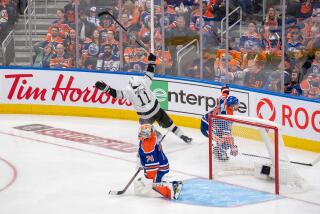THE NHL : Political Situation Cools U.S.-Soviet Series
They put together the original Big Red Machine.
Beating them on ice gave this nation one of its biggest collective thrills of the 1980s.
The United States and the Soviet Union have had missiles pointed at one another for decades, but the only shots they exchanged came in sports venues.
Now, the great thaw has come to the Cold War.
And so, it would seem, has it come to the cold war once waged on ice.
Three Soviet teams are touring North America, playing all 21 NHL clubs in something called the Super Series.
But judging by Monday night’s game at the Forum, it’s just not as super as it was in the old days.
The Kings beat Khimik Voskresensk, 5-1, in a game that had more yawns than yells.
The crowd of 10,762 made as much noise at the announcement of the final score of the “Monday Night Football” game as it did over anything it saw on the ice.
The Kings seemed more happy at escaping without injury than beating a Soviet team for the first time in four tries.
But what of the Soviet point of view? Khimik Coach Vladimir Vasilyvev talked about that Monday through interpreter Aggie Kukulowicz.
Question: Does the Soviet-American rivalry mean as much with the end of the Cold War?
Answer: Sport is sport. Certainly, before, our people were in a Cold War. But now, times have changed. There are cultural and economic exchanges. The military people are talking to each other. It’s a warmer climate. But in sports, we speak a different language. The connotation is different from politics. We have pride, the same as on your side. We do not want to let ourselves get beat. Politics is politics. Sport is sport.
Q: Are you surprised that the eight Soviet players who joined the NHL last season didn’t fare better?
A: (The Calgary Flames’ Sergei) Makarov did well, and I knew he would. But you have to remember, what these players went through was a 180-degree turnaround. They had to leave their country. They didn’t know the language. They had problems getting their kids in school. They had to adapt to a new country while the other players only needed to learn hockey. Like Makarov says, give us a year and we’ll do much better.
Q: What is the biggest adjustment Soviet players have to make on the ice?
A: In our system, the coach is No. 1. He does everything. You look at the players here, they have influence. Like a (Wayne) Gretzky. Is the coach in complete control? Not so much here. That’s something our players have to adapt to.
Q: There has been a movement away from a violent style in the NHL and toward the more wide-open skating style of European hockey. Is is evident to you?
A: You can see it happening. Let’s not lose our heads and say the NHL is playing quiet. But before, when you would walk in, it was an automatic war. They know now that is not the way to win because of the increased speed of the game. It’s not the European style. They are still playing their own game. But, they are playing more combinations, more two-on-ones.
Q: The use of aluminum sticks is catching on in the NHL. Gretzky uses one. Are the Soviets also considering the use of aluminum?
A: At this stage, there are no plans. Gretzky could play with anything and be good. He could play with a club and be good.
Q: With decreased interest on the North American continent, do you see the Soviet-NHL series continuing?
A: It’s got to continue because it upgrades the knowledge of all players. We both have our own leagues, but playing against the best upgrades the talent. There is no other way. Hockey has been helped by our meetings. You have your stars. We have ours. But this is good for the coaches, for the trainers, for the players and fans.
End of the Road? The Super Series doesn’t figure to continue in its present form.
Next year, the Canada Cup returns. In 1992, the international competition will be held in the Winter Olympics.
And beyond that, there is talk of a revamped format for the Super Series, involving the top six NHL clubs and perhaps an equal number from abroad--a combination of Western European and Soviet teams.
Add Canada Cup: It will run from late August until mid-September in three Canadian cities--Toronto, Montreal and Hamilton--and three American cities--Detroit, Chicago and Hartford. Participating players will miss training camp and about half of the NHL exhibition season.
Quotebook: King Coach Tom Webster noticed some differences in the Soviet game Monday night.
“They dumped the puck in much more than they used to,” he said. “And they shot the puck a lot from high up. Usually . . . they would try to work for a perfect shot.”
Defenseman Alexander Smirnov, Khimik’s team captain, said that is a result of the smaller ice surface, but had no complaints.
“It makes the game faster and more dynamic,” he said. “There is no time to get bored.”
More to Read
Go beyond the scoreboard
Get the latest on L.A.'s teams in the daily Sports Report newsletter.
You may occasionally receive promotional content from the Los Angeles Times.






